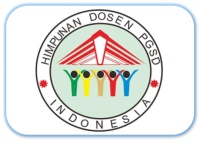Abstract
This reseach aimed to elicit the difference in learning outcomes of time measurement using CTL model and RME. This type of research is an experimental study using quasi experimental design with the two group post-test only. The sample in this research consisted of two groups of fifth grade students from VA and VB class from SDN 15 Ampang Gadang. The number of subjects included into this research in 39 students consisting of 20 students from class VA as CTL model group and 19 students from class VB as RME model group based on purposive sampling technique. Based on the analysis,we obtained the average value of the CTL model group was 80.55 while the RME model group was 85.The calculation result was measured with the t-test and obtained tcount 20.53> ttable 2.02 at the level of α 0.05. It showed that there were differences in learning outcomes using CTL models and RME. From this research, we also concluded that the application of the RME model was better than CTL model in fifth grade student from SDN 15 Ampang Gadang..Keywords: The CTL Model, The RME Model, Learning outcomes of measuring time.
References
Hudson. Contextual Teaching and Learning for Practitioners. Adult and Career Education. Volume 6 - Number 4, ISSN: 1690-4524.
Lestari, Karunia Eka dan M. Ridwan. (2015).Penelitian Pendidikan Matematika. Bandung: PT Refika Aditama
Purwanto. (2009). Evaluasi Hasil Belajar. Yogyakarta:Pustaka Pelajar
Risman. (2014). Model dan Metode Pembelajaran Inovatif dan Berkarakter. Bandung:Ghalia Indonesia.
Satriani. (2012). Contextual Teaching And Learning Approach. Indonesian Journal of Applied Linguistics. Vol. 2 No. 1, pp. 10-22.
Shoimin, Aris. (2014). 68 Model Pembelajaran Inovatif dalam Kurikulum 2013. Yogyakarta: Ar-Ruzz Media.
Sugiyono. (2012). Metode Penelitian Kuantitatif, Kualitatif, dan R&D. Bandung: Alfabeta.


